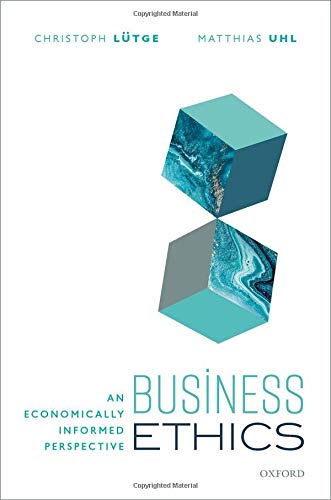Andy Hartropp: “Business Ethics: An Economically Informed Perspective” by Christopher L. & Matthias U.

Some of the toughest and most complex challenges faced by businesses and corporations in today’s world involve ethics and morality. This is in part why the study of business ethics has now become central in MBA and other programmes. But the very complexity of these challenges, in an increasingly pluralized as well as globalized world, present a danger that companies lose sight of the big picture – failing to see the wood for the trees.
Lutge and Uhl seek to assist here by providing a comprehensive overview of the essential concepts of business ethics related to the economy as a whole. At the same time, they offer a wide-ranging analysis of the issues and tools that corporations need to be aware of as they consider the ethical and moral dimensions of their activities. So, this book – Business Ethics: An Economically Informed Perspective – is distinctive and helpful in the comprehensiveness of what it offers.
Lutge and Uhl are German-based scholars who evidently have deep knowledge in these very important areas – which cover a wide range of academic disciplines. The quality of their English writing is very good, and the book will be a valuable resource both for companies (especially medium-size and large companies), as well as individuals who have senior-level responsibility.
The authors sometimes refer to their book as a ‘textbook’. However, my impression is that is more of a comprehensive survey than a teaching book as such.
Chapter 1 sets the scene by discussing briefly the phenomenon of globalization. The authors argue that globalization poses a challenge to virtue ethics: “It is an enormous challenge to find some plausible common ground” for a meaningful ethical dialogue “if a common denominator of values does not exist” (pages 13-14). The authors propose that a more helpful approach is offered by order ethics: the focus here is more on rules than on values. “The key idea of order ethics is to look out for strategies on the level of rules that enable win-win solutions for all affected parties” (page 14). The authors return to this emphasis a number of times.
Chapter 2 provides a brief analysis of the relationship between ethics and economics. The authors interpret business ethics as ethics with an economic method. This links to the book’s subtitle: An Economically Informed Approach. Lutge and Uhl argue that, from the point of view of business ethics, “production and distribution should be recognized as interdependent and therefore only discussed simultaneously” (page 26). Similarly, “it is only in the interplay of ethical reflection and economically informed implementation that rules and institutions can be created that are resistant to exploitation and mutually beneficial” (page 31).
Chapter 3 surveys the development of business ethics thinking in the historical context of the distinction between premodern and modern companies. The authors include a brief survey of ethical teaching in the Bible and Christian thought, as well as Hinduism and Islam. They argue that the complexity of the 21st century world means that it is insufficient to have an ethics of behaviour: one must also think about the ‘ethics of conditions’, by which they mean the rules of competition (page 52). This chapter makes a strong case for the benefits of markets and competition. It also argues that business ethics can to some degree be regarded as a form of risk management. “Especially in an information society…it is in the company’s own interest not to ignore the moral dimension of its own actions” (page 37).
Chapter 4 is a more lengthy survey of key models and tools of business ethics and corporate ethics. It consists of three sections: the first looks at philosophical foundations and tools, such as deontology and consequentialism and contractual concepts (e.g., the work of Hobbes, Kant and Rawls). The second section focuses on economic and social-science foundations and tools, such as the rational actor, dilemma structures (e.g., the ‘Prisoners’ Dilemma’) and the concept of utility. These tools are applied to concepts of justice. The third section deals with psychological foundations and tools. Major subjects considered here include the social intuitionist model of moral judgment and the concept of bounded ethicality: a perhaps unfortunate piece of jargon which essentially refers to the study of how and why ethical decision-making can be inconsistent and thus problematic – both on the part of individuals and organizations.
It would be fair to say that the evident breadth and depth of Chapter 4 means that it is not easy reading. But this chapter does illustrate the usefulness of the book as a comprehensive survey, and thus a tool for reference and reflection.
Chapter 5 looks in depth at some of the challenges of the modern globalized world, and seeks to show how these impinge on business ethics. This chapter considers absolute poverty and relative poverty, and then evaluates the extent to which equality is a valid goal, in ethical terms. The authors’ overall approach is reflected in the following words: “It does not make sense to construct a fundamental trade-off between freedom and equality. Rather, there should be a search for win-win opportunities that improve all parts of society so that no group feels systematically left behind” (page 168).
Chapter 6 is the last and most comprehensive chapter in the book, and addresses a number of aspects of corporate ethics. In doing so, it pays due attention to the fact that companies are key players in the globalized world. Again, this book is seen to offer a very important survey of material and perspectives that are vital, especially for larger corporations. A number of case studies are provided (in this and other chapters) which help to highlight the practical nature of the challenges and ethical issues.
Chapter 6 provides a detailed analysis of compliance – as a minimum ethical requirement – including the limits of compliance. It then considers different perspectives on corporate responsibility, including the relationship between profit-maximization and ethical responsibility, and corporate ethics based on the role of ‘the honourable gentleman’ – this latter approach having been recently revived through, for example, the Harvard Business School: “As one of the world’s top management schools, it is providing a prominent stage for individualistic concepts and moral codes” based on honour (page 237). The authors are, however, sceptical and critical of this development: the question arises as to how such an approach “can be implemented in concrete terms in the context of value pluralism. Even if it were possible to agree on certain values – at least within a certain cultural sphere – there would be obvious disparities in the actual evaluation and respective weighting of particular actions” (page 238).
The authors argue, instead, that the complexity of the modern world “requires the implementation of ethical values in the form of rules and institutions” (page 239). However, it would seem that further thought is required here: unless there really is some given moral foundation for behaviour and conduct – such as that provided by the Christian faith – then any “implementation” of ethical values is ultimately lacking in foundation. Even though today’s world evidently exhibits some degree of moral pluralism – and hence relativism – it is still surely possible to draw people together to engage in meaningful conversation about what is right and just.
Chapter 6 concludes with a survey of concepts of corporate social responsibility, including the importance of guarding against reputational risk and loss that can arise if companies fail to act in line with ethical principles. Once again, this illustrates the usefulness of the book as a comprehensive reference, to help guide companies, and those who have senior responsibility, through the complexities that surround business ethics.
“Business Ethics: An Economically Informed Perspective” by Christopher Lutge and Matthias Uhl was published in 2021 by Oxford: Oxford University Press (ISBN 978-0-19-886477-6). 353pp.
 Revd Dr Andy Hartropp is an economist, theologian and church minister. He has two PhDs, one in Economics and one in Christian Ethics. He lectured in financial economics for 5 years at Brunel University, west London. He also worked for a year with the Jubilee Centre in Cambridge, primarily leading a team doing research on families in debt. He trained at Oak Hill College, London, for ordained ministry in the Church of England. His (second) PhD was published as: What is Economic Justice? Biblical and secular perspectives contrasted (Carlisle: Paternoster, 2007). He has spent 13 years in parish ministry. He worked for eight years with the Oxford Centre for Mission Studies, where he was the Sundo Kim Research Tutor in Mission and Economics. In March 2016 he joined Waverley Abbey College as Director of Higher Education. He chairs the Ethics and Social Theology Group of the Tyndale Fellowship. He is married to Claire, and they live in Bicester, near Oxford.
Revd Dr Andy Hartropp is an economist, theologian and church minister. He has two PhDs, one in Economics and one in Christian Ethics. He lectured in financial economics for 5 years at Brunel University, west London. He also worked for a year with the Jubilee Centre in Cambridge, primarily leading a team doing research on families in debt. He trained at Oak Hill College, London, for ordained ministry in the Church of England. His (second) PhD was published as: What is Economic Justice? Biblical and secular perspectives contrasted (Carlisle: Paternoster, 2007). He has spent 13 years in parish ministry. He worked for eight years with the Oxford Centre for Mission Studies, where he was the Sundo Kim Research Tutor in Mission and Economics. In March 2016 he joined Waverley Abbey College as Director of Higher Education. He chairs the Ethics and Social Theology Group of the Tyndale Fellowship. He is married to Claire, and they live in Bicester, near Oxford.
